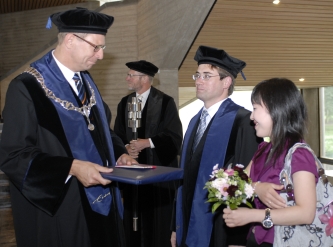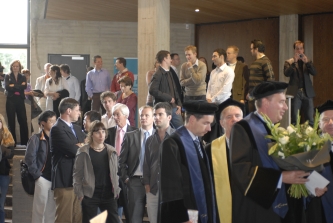On the real effects of private equity
 According to many politicians and journalists, private equity investors are “latter-day robber barons” or even “vultures” plundering companies and evading taxes. In his inaugural lecture, "<link erim events _blank>On the real effects of private equity", <link people peter-roosenboom _blank>Prof.dr. Peter Roosenboom has examined these criticisms, concluding that those casting private equity investors as villains are being one-sided in their assessment. On the contrary, he argues that private equity investors can have a beneficial effect on the investment climate. On September 4, Roosenboom has accepted the endowed Chair of Entrepreneurial Finance and Private Equity at the Rotterdam School of Management, Erasmus University.
According to many politicians and journalists, private equity investors are “latter-day robber barons” or even “vultures” plundering companies and evading taxes. In his inaugural lecture, "<link erim events _blank>On the real effects of private equity", <link people peter-roosenboom _blank>Prof.dr. Peter Roosenboom has examined these criticisms, concluding that those casting private equity investors as villains are being one-sided in their assessment. On the contrary, he argues that private equity investors can have a beneficial effect on the investment climate. On September 4, Roosenboom has accepted the endowed Chair of Entrepreneurial Finance and Private Equity at the Rotterdam School of Management, Erasmus University.
“We currently know little about the economic impact of private equity at country or economic-sector level,” says Roosenboom..”Although policy makers often take a dim view of takeovers by private equity investors, they mostly welcome investment in startups – venture capital. In doing so, they assume that venture capital improves the investment climate in Europe and that venture capital provides funding for fledgling companies which have a hard time obtaining capital from banks.”
In his address, Roosenboom will argue that private equity is here to stay in our modern economy. ‘Private equity investors’ is the catchall term for investors making risk-bearing capital available to unlisted companies. In recent times, corporate takeovers by private equity funds have come in for a lot of criticism. In the first part of his inaugural address, Roosenboom will take a closer look at the picture of private equity being painted in the media and will discuss the criticism of this type of investment by journalists and politicians.
In the second part of his inaugural lecture, Roosenboom sheds light on the findings of Europe-wide research that he’s recently conducted. His study shows that private equity, particularly venture capital, does increase the number of companies being launched in a country or an economic sector.
Indeed, in the current discussion, these and other economic implications of private equity are often ignored. Private equity investors are all too often labeled as ‘gluttons at the gate’ whereas they can also create value for companies they invest in and the economy at large.
 About Peter Roosenboom:
About Peter Roosenboom:
Peter Roosenboom is Professor of Entrepreneurial Finance and Private Equity at RSM Erasmus University. He holds a PhD in finance from Tilburg University (2002). His work has been published in leading international journals such as the Journal of Corporate Finance, Contemporary Accounting Research and the Journal of Banking & Finance. He is also a member of the Governing Board of PEREP_Analytics, a data collection platform of the European Private Equity and Venture Capital Association (EVCA). In the first part of the inaugural address he confronts the negative press on takeovers by private equity investors with the academic literature on the effects of these private equity buyouts. In the second part he discusses his recent research on the real effects of private equity, an in particular venture capital, on new business creation at the country and industry level.
Abstract:
Private equity has become an increasingly important part of our economy. Around the world the companies owned by private equity investors account for a substantial percentage of Gross Domestic Product (GDP) and private sector employment. These investors have recently been under fire in the media when they takeover companies. Private equity investors are at best seen as ‘kings of capitalism’ and at worst as ‘barbarians’ and ‘weapons of mass destruction’. The first part of this address contrasts this negative press with what we know about the real effects of private equity from academic studies. In general, private equity seems to be more negatively written about in the media then is warranted based on recent empirical evidence. However, as this address will show the jury is still out on a large number of issues that deserve further attention.
 One of the issues we know surprisingly little about is the real effects of private equity. Although policymakers are extremely wary of buyouts, they tend to welcome venture capital investments. They believe that venture capital helps to close the funding gap faced by small high-growth companies that banks are reluctant to finance. The second part of this address discusses recent research that investigates the impact of private equity on the creation of new businesses in Europe. We find that private equity positively impacts the number of start-up firms at the country and industry level. Especially the availability of venture capital to finance these new ventures has a positive impact on new business creation, as many European policymakers assume.
One of the issues we know surprisingly little about is the real effects of private equity. Although policymakers are extremely wary of buyouts, they tend to welcome venture capital investments. They believe that venture capital helps to close the funding gap faced by small high-growth companies that banks are reluctant to finance. The second part of this address discusses recent research that investigates the impact of private equity on the creation of new businesses in Europe. We find that private equity positively impacts the number of start-up firms at the country and industry level. Especially the availability of venture capital to finance these new ventures has a positive impact on new business creation, as many European policymakers assume.
More Information
Pictures of the Event
Full Text of the Inaugural Address
<link people peter-roosenboom _blank>Personal Homepage Peter Roosenboom


